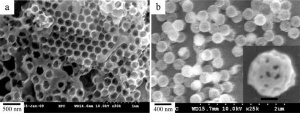May 20 2009
In an advance toward preventing car windshields and eyeglasses from fogging up, researchers in China are reporting development of a new way to make raspberry-shaped nanoparticles that can give glass a permanent antifogging coating. Their study is scheduled for the June 11 edition of ACS' The Journal of Physical Chemistry C.
 A new method for making raspberry-shaped nanoparticles could prevent windshields and eyeglasses from fogging. Credit: The American Chemical Society
A new method for making raspberry-shaped nanoparticles could prevent windshields and eyeglasses from fogging. Credit: The American Chemical Society
Junhui He and colleagues note that researchers have been working on anti-fog technology for years. Fogged-up windows are a safety hazard and a nuisance that affect millions of people. Existing technology, including sprays that must be reapplied to stay effective, has many drawbacks.
Researchers knew that raspberry-shaped nanoparticles could be the ideal solution by disrupting the process in which water droplets fog glass. Until now, however, there has been no commercially feasible way to make these particles.
The scientists describe an efficient one-step method for making nano-raspberries. In laboratory studies, the researchers coated glass slides with the particles, cooled the slide, and then exposed it to steam. Unlike ordinary glass, it remained crystal clear, opening the door to possible commercial applications, the researchers say.
More information: The Journal of Physical Chemistry C, "Facile Fabrication of Raspberry-like Composite Nanoparticles and Their Application as Building Blocks for Constructing Superhydrophilic Coatings"